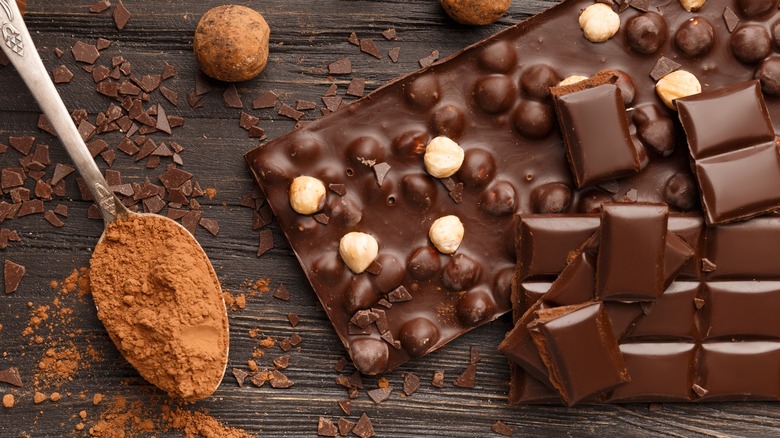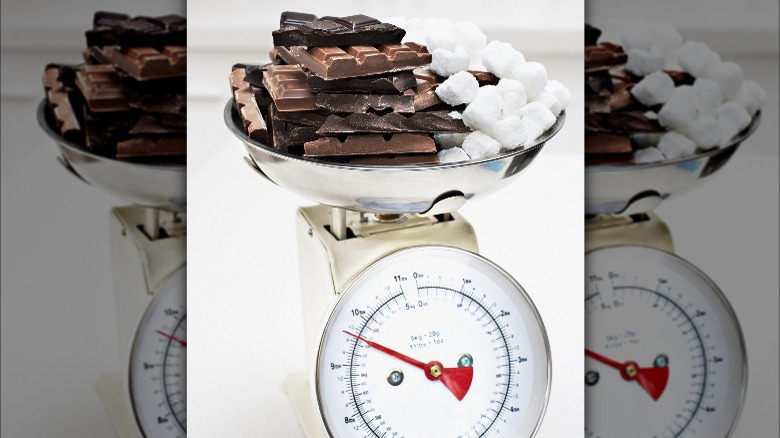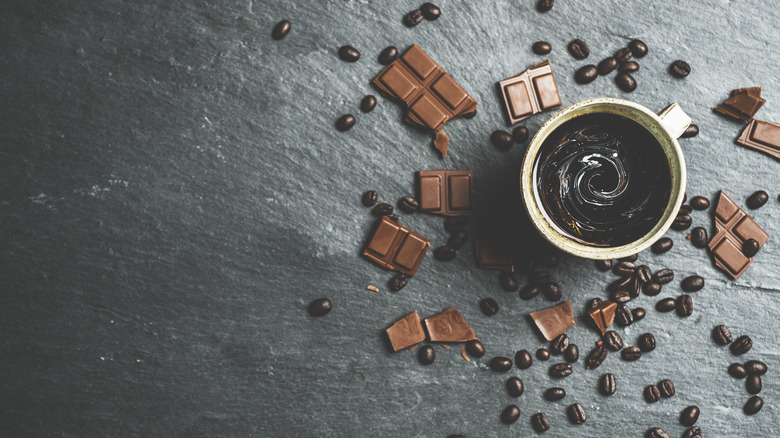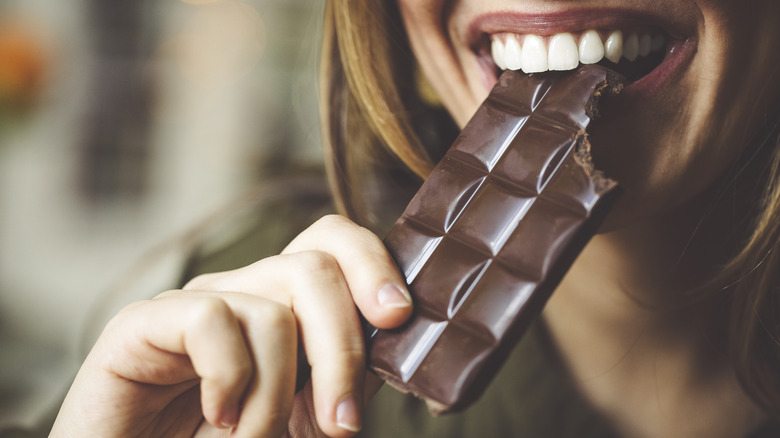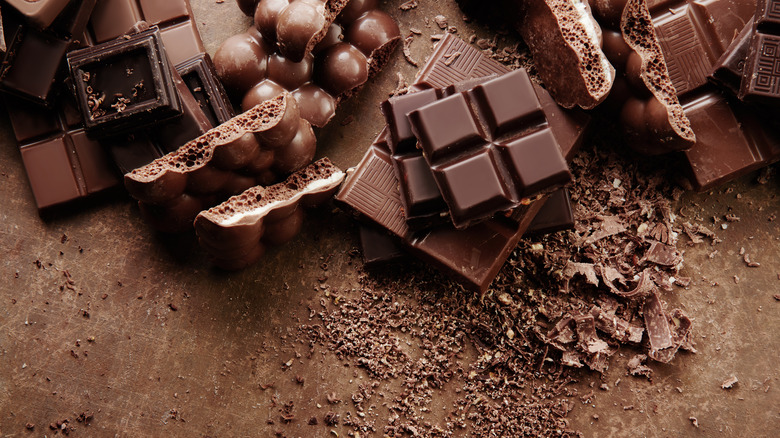Chocolate Myths You Need To Stop Believing - Exclusive
Chocolate is one of our most beloved foods. We eat it in the form of chocolate cake to celebrate birthdays, we deliver boxes of chocolate truffles to support loved ones and honor holidays, and we drink it in the form of hot cocoa to warm our bodies in the winter. Everyone has a different relationship with chocolate and a different memory of the first time they tasted that decadent, creamy, complex flavor, often in the form of a plastic-wrapped chocolate candy bar.
To celebrate World Chocolate Day, we spoke with Michelle Pickering, a chocolate sommelier who serves as the Senior Vice President Global Chocolate & Cocoa Research & Development in Europe at Mondelez International, the company responsible for some of our favorite chocolate brands, including Toblerone, Cadbury, and Milka. Pickering, who uses scientific practices to evaluate chocolate, believes "chocolate is a highly emotional topic [which is] why there are so many myths" surrounding it. In our interview, Pickering broke down the most common myths she's heard about chocolate and provided definitive answers to our most pressing chocolate questions.
Will chocolate make you gain weight?
One of the first and most common questions chocolate sommelier Michelle Pickering is asked from consumers is whether eating chocolate will make them gain weight. You may be wondering this as well as chocolate is sometimes referred to as a vice, an indulgence, or a standard food during a "cheat day." Well, we have wonderful news for you chocolate lovers. According to Pickering: "Anything you eat as part of a healthy diet is not going to make you gain weight." That means chocolate — in conjunction with an otherwise health-focused diet — isn't a problem. Additionally, chocolate is rich in antioxidants, which can actually improve your overall health.
"Have a look at the calorie content of chocolate... one bar's about 220 calories, [which is] perfectly acceptable within a normal diet," Pickering shared. Not convinced yet? She had the science to prove it, saying, "We have data that shows [that] if you eat some chocolate, [if] you have that small indulgence, you're at a lower risk of going on a big binge and eating too many high-calorie foods." Chocolate helps temper those impulses.
You heard it here: Chocolate can actually help prevent weight gain when eaten in moderation alongside a well-balanced diet.
Is chocolate high in caffeine?
Caffeine may be a desirable attribute for some consumers looking for a little energy boost with their sweet fix, but for others, health concerns related to high blood pressure, pregnancy, or migraines can make the presence of caffeine a reason to turn away from chocolate. According to Pickering, "Yes [chocolate] does contain some caffeine, but a 100-gram bar of chocolate runs about [only] 6 milligrams of caffeine." For reference, an average chocolate bar traditionally weighs less than 100 grams, usually somewhere between 56 and 85 grams, which would result in even lower caffeine content. To put that number into perspective, "one cup of coffee is 65 to 135 milligrams of caffeine." In comparison, Pickering finds that chocolate's caffeine content is "minuscule in the grand scheme of things." Of course, every person responds to caffeine differently and some may be more sensitive to feeling the effects than others.
Now what about dark chocolate? Dark chocolate has a higher caffeine content than milk chocolate because "the caffeine comes from the cocoa. [Hence] the more cocoa, the more caffeine. [So if there are] 6 milligrams [of caffeine] in a milk chocolate [bar]; a [typical] dark chocolate [bar] at double that is going to [have] 12 [milligrams]. [And eighty percent] cocoa solids will be three times that," so let's call it a caffeine content of 18 milligrams, which is still significantly less than the caffeine in one cup of coffee.
Will chocolate give you acne?
In the food world, there is often discussion about how our diets impact our overall health. Eating an excess of processed foods can lead to diabetes, heart disease, and obesity. Another health concern that is less serious, but still a focus for many, is the question of what food choices may lead to acne. Pickering shares that when she was growing up, "People would say, 'Oh, you eat too much chocolate, you're going to get acne.'" But that is actually a myth. According to Pickering, "There's been so much dermatological proof that actually shows that's not true."
It's perhaps best to think about the possibility of acne in the same way we think about the possibility of weight gain. Chocolate alone won't cause either of those issues if you maintain an otherwise healthy diet, but chocolate in conjunction with poor hygiene and dietary choices might contribute to overall negative health outcomes. So, let this be your sign to go for that bar of chocolate without having to worry about a breakout the following morning.
There's a universal measure for chocolate quality
As lovers of chocolate, we were curious to understand how chocolate sommelier Michelle Pickering measures the quality of different chocolates. We were looking for a universal method to help select the very best chocolate bar from the grocery store, but Pickering's answer surprised us. "[The] quality of [the] chocolate really is determined by the consumer. You might [have a] consumer [who], say[s], 'For me, very high-quality chocolate is something that's extremely smooth and luxurious and indulgent, and it's got very high, rich, intense cocoa nuts.'" For that consumer, the best quality chocolate would likely have a higher percentage of cocoa. But for "a different consumer, quality chocolate for them [might] be something that [has] much less cocoa, [is] much sweeter, and that [has a] great taste for them."
Beyond personal preferences, from Pickering's scientific research, she's seen that there's a geographical factor at play. "We know from the work we do around the world [that] depending [on] where you live, your ideal quality—your ideal sensory experience of chocolate is different," she explained. This is perhaps why chocolate products vary in different corners of the globe.
